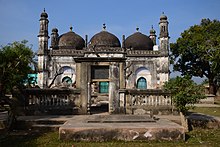Jama Masjid (also known as both Kala Masjid and Motijheel Mosque) is a congregational mosque located at Motijhil, in the historic city of Murshidabad, West Bengal, India.
| Jama Masjid, Motijheel | |
|---|---|
 | |
| Religion | |
| Affiliation | Islam |
| Leadership | Nawajish Muhammad Khan |
| Year consecrated | 1749–50 |
| Location | |
| Location | Murshidabad, West Bengal, India |
| Geographic coordinates | 24°09′44″N 88°16′32″E / 24.162124°N 88.275552°E |
| Architecture | |
| Type | Mosque |
| Style | Islamic |
| Specifications | |
| Dome(s) | 3 |
| Minaret(s) | 4 |
Geography
edit1mile
Gate
railway bridge
railway station
F: facility, H: historical site
Owing to space constraints in the small map, the actual locations in a larger map may vary slightly
Location
editJama Masjid is located at 24°09′44″N 88°16′32″E / 24.162124°N 88.275552°E.
Jama Masjid stands on the western bank of Motijhil.[1]
Hazarduari Palace and its associated sites in the Kila Nizamat area (forming the central area in the map alongside) is the centre of attraction in Murshidabad. Just a little away are Katra Masjid, Fauti Mosque, Jama Masjid and the Motijhil area. There is a group of attractions in the northern part of the town (as can be seen in the map alongside). Some attractions such as Khushbagh, Rosnaiganj, Baranagar, Kiriteswari Temple, Karnasuvarna and others are on the other side of the river and there are attractions in the neighbouring Berhampore area also (not shown in the map).[2]
Note: The map alongside presents some of the notable locations in Murshidabad city. Most of the places marked in the map are linked in the larger full screen map. A few, without pages yet, remain unmarked. The map has a scale. It will help viewers to find out the distances.
Jama Masjid
editHistory
editJama Masjid was built by Nawab Nawaei Muhammad Khan in 1750. He named it Kala Masjid and is also well known as Motijheel Mosque.[1]
Ghaseti Begum, the eldest daughter of Nawab Alivardi Khan, adopted Ekramulla, the son of her younger sister Amina Begum and the younger brother of Siraj ud-Daulah, and brought him up as her own son. Ekramulla died at a young age. Ghaseti Begum's husband, Nawaei Muhammad Khan, could not bear the shock and died. Both of them were buried in the Jama Masjid compound. It is said that Nawab Alivardi Khan used to come regularly to the Jama Masjid to offer prayers.[1]
According to the List of Monuments of National Importance in West Bengal the Motijheel Jama Mosque is an ASI Listed Monument.[3]
Structure
editJama Masjid has three domes and a three arched façade.[1] Banglapedia describes the mosque as being rectangular in plan and covered by three hemispherical domes. Octagonal minarets capped by bulbuous kiosks are placed in the four corners.[4]
Jama Masjid picture gallery
edit-
Jama Masjid
-
Jama Masjid
-
Jama Masjid area
-
Graves of Nawarish Muhammad Khan, Ekramulla and others
See also
editReferences
edit- ^ a b c d "Motijhil Jama Masjid". ASI, Kolkata Circle. Retrieved 20 June 2021.
- ^ "Offbeat Weekend in Murshidabad". Outskirts of Killa Nizamat (Northern part). Offbeat Weekend. Retrieved 20 July 2021.
- ^ "List of Ancient Monuments and Archaeological Sites and Remains of West Bengal - Archaeological Survey of India". Item no. 129. ASI. Retrieved 20 July 2021.
- ^ "Motijheel, Murshidabad". Banglapedia. Retrieved 20 July 2021.
External links
editMurshidabad travel guide from Wikivoyage